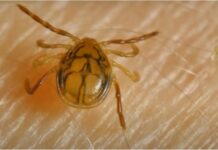Few of us will forget the Zika virus epidemic of 2016, which resulted in hundreds of infants being born with birth defects after their mothers were infected during pregnancy.
During that time, pregnant women were warned against traveling to areas that had active Zika outbreaks, both in the U.S. and abroad.
A 2018 CDC study noted that new diseases transmitted by both ticks and mosquitoes are a growing public health threat in the U.S.
Still, the risk of catching a mosquito-borne illness in the U.S. is low. For many diseases, only a few cases are reported across the entire country each year. And several smart steps can help you prevent mosquito bites in the first place.
Here, we’ll explain what you need to know about mosquito diseases in the U.S. and internationally—plus how to keep yourself from contracting one.
West Nile Virus
West Nile virus can cause a few days or weeks of fever and other flu-like symptoms, vomiting, diarrhea, and rash, as well as fatigue and weakness that can last for weeks or even months during recovery. According to the CDC, about 1 in 150 people infected with the virus develop encephalitis or meningitis. And about 10 percent of those people die.
So the true numbers may be much higher. The MMWR study points out that other research suggests that for every single neuroinvasive case, there may be anywhere from 30 to 70 more people with mild West Nile.
La Crosse Virus
La Crosse, a member of what’s known as the California serogroup viruses, can cause fever and flu-like symptoms. Its severe form, which can bring seizures, encephalitis, coma, and paralysis, tends to strike children younger than 16. Fewer than 1 percent of cases are fatal.
Although La Crosse was the second most common mosquito-borne disease reported in the U.S. in 2018, health officials received notice of just 86 cases. But 83 of those were classified as neuroinvasive, and the CDC says that less severe illness due to this virus is probably substantially underreported. La Crosse virus is seen mostly in the upper midwestern, mid-Atlantic, and southeastern states.
Eastern Equine and St. Louis Encephalitis
Eastern equine encephalitis, a rare but potentially deadly mosquito-borne disease, has been in the news recently: Florida health officials warned that the virus was discovered in chickens there in July, and Michigan’s Department of Health and Human Services found two cases in horses this month.
Only a handful of cases occur each year. Just six neuroinvasive cases were reported in 2018, and five in 2017, mostly in states on the East Coast, Gulf Coast, and Great Lakes.
Mosquito Diseases Outside the U.S.
If you’re traveling internationally, you can get the lowdown on mosquito-borne illnesses in your destination before leaving home. The CDC has information for travelers about Zika, as well as for chikungunya, dengue, and malaria.
More than 1,000 cases each of dengue and malaria are usually reported in the U.S. every year, but the vast majority are contracted internationally.




